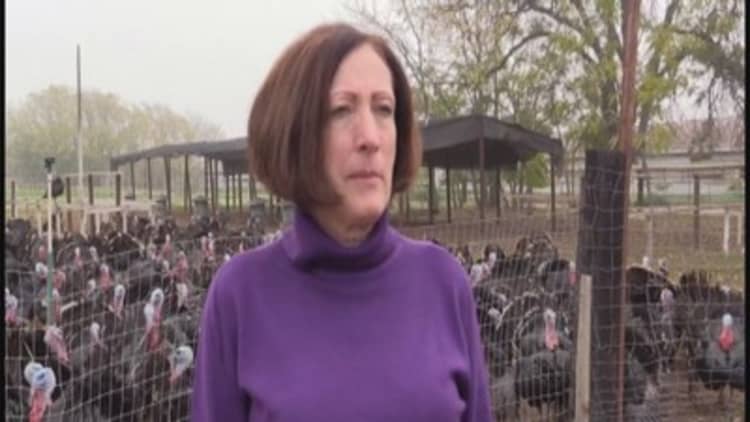Demand for turkeys is strong ahead of the holidays, and some producers wish they had more birds to go around for Thanksgiving, but consumers may dodge high prices for their dinner tables.

"We didn't have all the turkeys to fulfill demand," said Gary Cooper, chairman of the National Turkey Federation and owner of Cooper Farms in Ohio. "We could have literally sold more turkeys had we had them as an industry."
Turkey producers were cautious about increasing the size of their flocks after experiencing poor profitability in recent years because of volatility in corn prices. As a result, there were not enough birds to go around this year for the industry, according to Cooper.
A number of things would seem to point to higher retail turkey prices right now: Turkey production is at its lowest level in almost 30 years, and wholesale prices are at an all-time high.
Read MoreCalifornia farm slugging it out with labor union
But that isn't likely to drive turkey prices up for the holiday season. Some stores will offer whole turkeys as loss leaders in hopes of enticing consumers to buy other items for the Thanksgiving dinner.
"Nobody leaves the market with just a turkey," said Michael Sheats, who tracks turkeys for the U.S. Department of Agriculture's marketing service.
Meijer, a Michigan-based grocery store chain operating in five states, said last week that it plans "to lead the Midwest in low-price Thanksgiving turkeys." Meijer plans offer frozen turkeys at 54 cents per pound, and it plans to offer fresh turkeys starting at 98 cents a pound.
We're seeing prices spike on the spot market. That speaks to a little bit of the shortage.Michael Sheats, USDA Agricultural Marketing Service
Corn and soy represent about three-quarters of a turkey's diet, and both crops are on target for record-high yields and production in 2014. But feed costs on turkey pricing are already priced into turkeys on the market now, explained Mary Pitman of Pitman Family Farms, which is known for its free-range and organic birds sold to Whole Foods Markets and other retailers. The Sanger, California-based company says farmers faced higher feed costs earlier this year.
But prices have slid since. According to the USDA's last preliminary report on farm prices, U.S. corn was priced at $3.28 per bushel in October 2014, compared with $4.63 per bushel in the year-ago period. During the same period, soybeans were at $9.64 per bushel vs. $12.50 per bushel a year earlier.
Read MoreWorld may not have enough food by 2050: Report
According to a USDA report released Monday, prices for frozen hen turkeys at the wholesale level averaged $1.16 per pound in October, up from $1.07 per pound the previous year, for an increase of 9 percent.
The majority of turkeys for Thanksgiving were contracted earlier in the year at a set price. However, sometimes retailers "spot" fill demand and pay much more than the original price on their contracts.
"We're seeing prices spike on the spot market," Sheats said. "That speaks to a little bit of the shortage and good interest out there in turkeys."
Growing demand for organic birds
Meanwhile, demand for organic and free-range turkeys continues to grow.
"Every year, we double our production of our organic turkeys and chickens," said Pitman. "And we never have enough. It's one of our fastest-growing markets out there."
Pitman produces and sells turkeys and chickens under the Mary's Free Range brand, and earlier this year introduced non-GMO turkeys. However, Pitman said it's been difficult to find local feed from GMO corn farmers because of the drought situation in Central California.
"Some farmers cannot grow non-GMO corn for us, because it takes a lot of water to grow corn," she said.
The organic and non-antibiotic birds represent nearly 10 percent of the overall turkey market and are growing every year.

